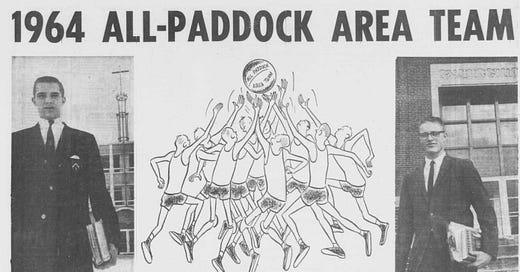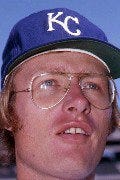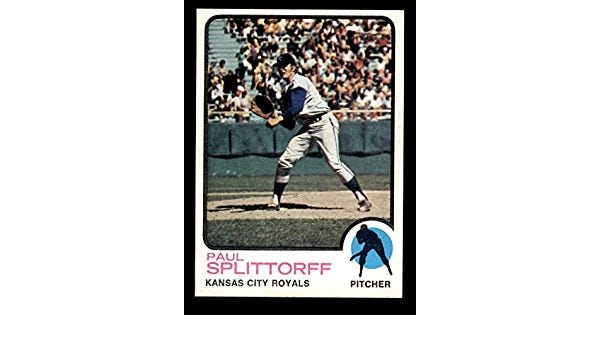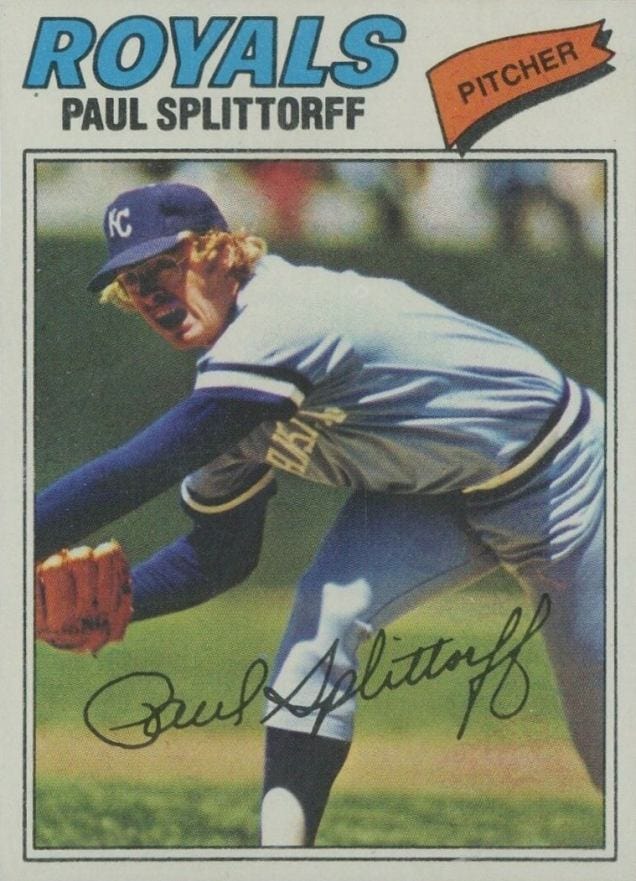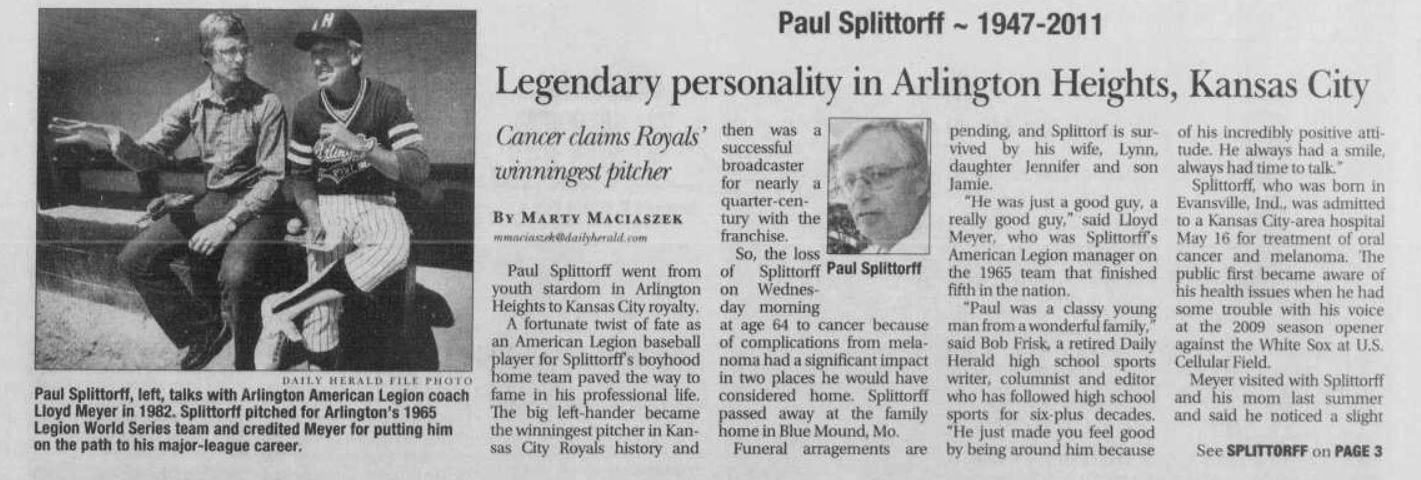MSL to MLB: Fifty Years Ago Splittorff Cemented His Place Among Kansas City Royalty
Arlington High Star Opened Royals Stadium En Route to 20-Win Season in 1973
Paul Splittorff ascended to one of the highest-ranking members of the Kansas City Royal family 50 years ago.
The professorial-looking Splittorff experienced tremendous success in baseball and basketball at Arlington High School. But he was hardly on the fast track to the big time after he graduated in 1964.
Then came a fortuitous moment when a small-college coach in Iowa who was umpiring the 1965 American Legion World Series saw the tall left-hander deliver an impressive performance for Arlington. That put Splittorff on a path to Kansas City that would see him start the first game in sparkling new Royals (now Kaufmann) Stadium on April 10, 1973 and finish that season at old Comiskey Park (then known as White Sox Park) as the organization’s first 20-game winner.
It was a huge part of Splittorff’s glorious 39-year run with the Royals as a pitcher and broadcaster that sadly ended too soon when he passed away at 64 on May 25, 2011 after battling melanoma and oral cancer. His 166 victories have stood the test of time atop the Royals’ career leaders and conceivably may never be broken as starting pitchers such as Splittorff don’t last long into games or with the same team the way he did for 15 years.
Complete games and victories from starting pitchers don’t carry much weight in today’s baseball. In 1973, it was a huge deal for Splittorff to start and finish his third full season as a big-league pitcher the way he did.
A Bright Turn in a Promising Future
Paul Splittorff Jr. was born October 8, 1946 in Evansville, Indiana but the family of five eventually found a home in Arlington Heights. His father Paul Sr. clearly inspired his son to get involved in sports.
“He was very into sports and he spent a lot of time with me as a kid,” Splittorff told the Associated Press during the 1978 American League playoffs, just a few days after his father’s passing from lung cancer at 57. “He encouraged me to play sports, not just baseball, but basketball and football also.”
Splittorff gained as much acclaim in basketball as he did in baseball at Arlington High. He averaged 8.7 points a game as a junior and upped it to 17.1 as a senior to make the 1964 Paddock Publications All-Area team and earn all-West Suburban Conference honors. But he wasn’t too shabby on the pitching mound either, twice beating WSC champion Maine East 4-3 with 14 strikeouts in 10 innings and 4-0 on a 1-hitter with 6 strikeouts as a junior. He was all-WSC as a senior as he went 6-1 with a 1.52 ERA and 43 strikeouts in 46 innings.
Summers were spent pitching and playing first base for the legendary Lloyd Meyer and Arlington’s American Legion team. He went 8-0 in 1964 but things didn’t work out in his freshman year at Quincy College. So it’s no overstatement to say the summer of ‘65 was life-changing for Splittorff.
The Arlington Legion team captivated fans locally with the dynamic lefty duo of Splittorff and Forest View’s Tom Lundgren, who pitched at Missouri and had a brief stint in the minor leagues. Arlington won state and regional titles to make the national tournament for the first time in Aberdeen, South Dakota. A first-game loss put Splittorff on the hill for an elimination game against Lyndhurst, New Jersey, and he came through by scattering 8 hits with 8 strikeouts in 8 innings of a 7-1 victory.
One of the umpires, Don Protexter, also happened to be the head baseball coach at Morningside College, a small NAIA school in Sioux City, Iowa. Protexter got a glowing report from Meyer when they talked at a gathering at the end of the tournament. Splittorff never forgot what Meyer did for him.
“He made that opening contact (with Morningside) and without that it’s hard to say where I would have gone,” Splittorff said shortly after his midseason retirement in 1984.
He felt well-prepared for wherever he went from the coaching combination of Bob Baker in high school and Meyer in Legion ball. Baker had pitched in the minor leagues and taught Splittorff how to throw certain pitches and how to think through different situations. Meyer helped with the psychological edge and got Splittorff and others to believe in their abilities.
Splittorff became a two-time all-conference pitcher-first baseman and also played basketball in a Hall of Fame career at Morningside. He set a school record for strikeouts, had an impressive summer in the prominent collegiate Basin League and made two relief appearances as the United States won the gold medal in the 1967 Pan American Games.
Now he was on much bigger radar screens. An American League expansion franchise called the Kansas City Royals took Splittorff in the 25th round of the June 1968 draft and he made the jump to the pros even though he still had a year of eligibility left at Morningside. Legendary Royals scout Art Stewart, who drafted Bo Jackson, saw Splittorff pitch in high school and Legion ball as well.
“He didn’t throw that hard but he was one of the smartest young pitchers I ever saw,” Stewart told the Royals website after Splittorff’s death. “Even as a young pitcher he retained what he knew on a hitter. None of us were smart enough to draft him because he didn’t throw that hard. So he went to college and we drafted him. Then I saw him after we signed him and he was throwing harder, his fastball was a little better. He always had the good breaking ball, the good changeup.”
Splittorff pitched the organization’s first game for Corning (New York) in Class A and had 5 strikeouts and an RBI single. His manager, former big leaguer Larry Osborne, said “Splittorff looks like a fine prospect.”
He made good progress the next two seasons at Triple-A Omaha. And then late in the 1970 season he got the call to the Royals and would make his first big-league appearance and start September 23 on the South Side against a White Sox team on its way to a team-record 106 losses.
Only 693 fans - that’s correct, 693 - paid to see Splittorff and the Royals lose 6-0 to the White Sox. But the kid from nearby Arlington Heights acquitted himself well as he trailed just 1-0 into the sixth inning and only 3 of the 5 runs he allowed were earned in 7 innings. He had 8 strikeouts even though that was never his strong suit and he never hit triple digits in a season again after compiling 110 in ‘73.
One of those in the park that day was legendary Daily Herald prep writer Bob Frisk.
“Paul Splittorff has pitched better games on better days, but he’ll always remember that damp, cloudy September afternoon at White Sox Park,” Frisk wrote in his “Kickin’ It Around” column two days later. “There wasn’t a big crowd, the weather was lousy, there was nothing at stake in any pennant race, and he lost the game, but for Splittorff, a graduate of Arlington High School, this was something very special.
“This was his first major league start as a pitcher for the Kansas City Royals. You always remember that first major league game.”
He would have an even more memorable one on that same mound three years later.
Splitt’s Dream Season of ‘73
Splittorff had a bit of a setback in ‘71 and was sent back to Omaha to start the season. He admitted to Frisk in a September column that “I was disappointed in myself for not showing more.” But after going 5-2 with a 1.48 ERA in 8 Triple-A starts, he was back in Kansas City and would never see the minors again as he went 8-9 with a 2.68 ERA in 22 starts.
One of the most memorable for the rookie came August 17 at Yankee Stadium when Splittorff faced another smart and crafty lefty named Fritz Peterson, who was a senior at Arlington when Splittorff was in eighth grade. Peterson went on to become a Hall of Famer at Northern Illinois University and won 133 games in his 11-year big-league career with the Yankees and Indians.
Peterson was already a six-year veteran coming off a 20-win season and All-Star Game appearance a year earlier when he squared off against Splittorff. The Yankee Stadium scoreboard noted the occasion of pitchers who would combine for 299 career wins with “Today’s pitchers went to the same high school in Arlington Heights, Ill.”
Peterson threw a 5-hit shutout and made 2 early runs hold up to improve to 13-7. Splittorff scattered 8 hits in 7 innings in the 2-0 loss.
“Peterson was great that day. We were just getting little squibbers off the bat,” Splittorff told Frisk. “ It really was something to have two pitchers from the same high school and I know Fritz didn’t realize it until after they had flashed the message on the scoreboard. I knew about Fritz and had become more aware of this possible meeting when my mom (Bettye) sent me an article from the Herald.”
Splittorff went 12-12 with a career-high 140 strikeouts in 212 innings in 1972. Exciting times were ahead for the Royals in 1973 as they moved out of Kansas City’s old Municipal Stadium into their sparkling new facility that featured spectacular fountains beyond the outfield walls and a huge scoreboard with a crown in center field. And on a 39-degree night, 39,464 turned out to see Splittorff open Royals Stadium in style against the Texas Rangers.
Splittorff threw a complete-game 5-hitter with 3 walks and 1 strikeout as the Royals rolled to a 12-1 victory. He was two outs from a shutout when Jeff Burroughs, the 1974 American League MVP, homered.
“My fastball was moving real well,” Splittorff said in the Independence and Jackson County (Kansas) Examiner. “Then, after we got the big lead, I just wanted to move the fastball in and out and make ‘em hit it. Really, after we scored four in the first, the pressure was off.
“I wanted to throw a strike on the first pitch. I wanted to hear the crowd roar the first time.”
Splittorff wouldn’t miss the zone much and would hear a lot of cheers throughout that season. Later that month he beat White Sox knuckleball workhorse Wilbur Wood 3-0 on a 2-hitter with 2 strikeouts and 2 walks.
“That’s as well as I can pitch,” Splittorff told the Associated Press. “It was one of those days when I could throw as hard as I wanted and at the same time put the ball where I wanted it.”
He rolled into early July at 12-5 and manager Dick Williams of the reigning World Series champion Oakland A’s told KC writers Splittorff would be on the AL All-Star team. But a back injury that cost him 3 starts resulted in a painful snub.
“Just going would have meant so much,” Splittorff, who never pitched in the Mid-Summer Classic, told Frisk.
Splittorff rebounded strongly from the layoff with a 3-hitter as he outdueled the White Sox’ Stan Bahnsen 1-0 at Royals Stadium. He was 15-6 on August 11 and looked like a lock to win 20 when he went 0-5 in his next 7 starts.
Fortunately, Splittorff’s young manager named Jack McKeon was ready to give him the ball as much as possible in September.
“He always had the confidence in me,” Splittorff told Frisk about McKeon, whose 2003 Marlins team would crush the hopes of Cubs fans in the NLCS and win the World Series.
Splittorff ended his skid with 7 shutout innings to beat the A’s, on their way to the second of three consecutive World Series titles, and 20-game winner Ken Holtzman 5-0. Four days later he would throw a complete-game 5-hitter with 10 strikeouts in a 4-0 win over the Angels and Bill Singer, who also finished the season with 20 wins.
Next up for Splittorff was a visit to KC by the White Sox on Sept. 20. He trailed by a run going to the bottom of the seventh but the Royals erupted for 7 runs that featured a 2-run single by Amos Otis and an RBI single by Freddie Patek. Splittorff went 8 innings and improved to 18-11 with a 10-3 victory.
In more evidence that it was a different era, Splittorff would make his next start against the Rangers and hard-throwing Jim Bibby with just two days of rest. Splittorff was staked to a 6-1 lead after 4 innings, survived a 3-run fifth and made it through 6 innings of a 7-4 victory to improve to 19-11.
So, on Sept. 26, once again with only two days of rest and just three years after making his big-league debut in his hometown, Splittorff was back on the mound at Sox Park. He was facing Bahnsen, who won 20 games a year earlier and still had an outside shot again with an 18-20 record. The crowd was bigger, although the 5,570 didn’t exactly pack the place on an 80-degree Wednesday evening.
The Royals lineup included a kid called up late in the season playing third base, batting second and hitting .100 named George Brett. Hal McRae gave Splittorff a lead with a 2-run double in the first but the Sox got one back in the bottom half on Carlos May’s RBI single. A solo homer to center in the fourth by big John Mayberry made it 4-1. Luis Alvarado got a run back in the sixth for the Sox on an RBI single but Splittorff avoided further trouble when he got Brian Downing to ground into a double play.
His night was over and he went to the clubhouse to watch Harry Caray call the rest of the game on Channel 44. We can’t confirm if that included a Falstaff and some Chicken Unlimited.
“I wasn’t really throwing that well but we were scoring the runs … and I was only going to pitch (six) regardless because they had been giving me every opportunity to win 20 over the final couple of weeks,” Splittorff said in Frisk’s mid-January 1974 column, “Winning 20 leads to an enjoyable winter.”
It was 6-2 going to the bottom of the ninth and Doug Bird had retired all six hitters he faced. But getting here hadn’t been easy for Splittorff and this wouldn’t be, either. Bird hit Bill Sharp, walked future Royals’ hero Jorge Orta and with one out walked Pat Kelly to load the bases for Johnny Jeter, an outfielder with good speed. Jeter hit a grounder on the astroturf infield to Patek at short, rookie and eight-time Gold Glove second baseman Frank White turned it to Mayberry and Splittorff’s amazing run to 20 was complete.
Splittorff finished 5-0 against a White Sox team that had been expected to contend for the AL pennant.
“There were many games I like to remember but nothing could really compare to the night I won my 20th here in Chicago,” Splittorff said. “The White Sox started to come back and I felt kinda helpless just sitting there. Then when it was all over and we had won, it was the greatest feeling I’ve ever had.”
Former big-league pitcher Galen Cisco, who had talked Splittorff out of quitting in the minors and spent nearly 30 years as a big-league pitching coach, was impressed.
“Paul, to put it simply, is a pitcher. He doesn’t have real overpowering stuff that some pitchers have but he’s smart,” Cisco said in Frisk’s column. “He won’t get himself in trouble. He’ll challenge the hitters and he’s always thinking. That may be the key to it all - the thinking. Paul Splittorff could be a big winner for a long time.”
He would be in some of the franchise’s biggest games in the ‘70s.
Postseason Happiness and Heartbreak
The next few years were tough for Splittorff as he dropped to 13-19 in ‘74 and went 9-10 in ‘75 and spent a big chunk of time in the bullpen. One of his big highlights that season was a 1-hitter against the A’s where he gave up a walk to Campy Campaneris and an infield single to Claudell Washington before retiring the final 26 hitters.
Splittorff rebounded in ‘76 and was 11-6 with an 8-game winning streak in late July when a torn tendon in the middle finger of his pitching hand knocked him out for six weeks. But he came back as the Royals won their first AL West title and manager Whitey Herzog planned to use him out of the bullpen in the ALCS against the Yankees.
Splittorff earned his reputation as a “Yankee Killer” after the Royals lost Game 1 and trailed 3-2 with 1 out in the third in Game 2. Splittorff came in and shut the door for 5⅔ innings on 4 hits as the Royals won 7-3. A solid 3 ⅔ innings of early relief in Game 5 kept the Royals in Game 5 but the Yankees won it and the series on Chris Chambliss’ dramatic homer in the bottom of the ninth.
His recovery from a 1-4 start to finish 16-6 in ‘77 was instrumental in the Royals chasing down the “South Side Hit Men” White Sox and meeting the Yankees in the playoffs again. This time, Herzog picked Splittorff to start the opener since he was 2-0 against the Yankees that season and 11-5 lifetime at that point. He went 8 strong innings to win 7-2.
“I was very nervous since it was the first game of the playoffs,” Splittorff said. “I was struggling at times but I made some good pitches when I had to, especially to (Reggie) Jackson and (Graig) Nettles. I ran out of gas in the seventh inning but I had a good eighth and I knew I was out of there in the ninth. I didn’t have my best stuff today but it was good enough. It’s a thrill and I’m honored the manager (Whitey Herzog) and my teammates have confidence in me.”
Again it came down to a decisive Game 5 and Splittorff’s dominance of the Yankees led manager Billy Martin to keep Jackson, soon to become known as Mr. October, out of the starting lineup. Splittorff went 7 strong innings and left with a 3-2 lead after giving up a leadoff single in the eighth, but a 3-run ninth and 5-3 win sent the Yankees to the World Series.
Splittorff was on the verge of winning 20 again in ‘78. He was 19-12 and throwing a 5-hitter with a 1-run lead and one out in the ninth in his final start at Seattle, but 2 singles and a triple led to a disappointing 4-2 loss.
“I wanted to be in there. All the regulars were in there and they didn’t need to be,” Splittorff told the Associated Press. “It was a personal thing. They were put out there for one reason - me. They completed their job last night when they won the division. By all rights they should have had the night off. But they were out there to help me win 20. I wanted to go for it. I felt OK. I’d rather be out there and take the loss than be sitting on the bench. It was my ballgame.”
He was poised to start Game 1 of Round Three of Royals-Yankees in the playoffs but the death of his father Paul Sr. pushed his start back to Game 3 with the series tied at 1-1.
“I’ll have some definite thoughts on my mind. Most of my thoughts will be with my mother,” Splittorff told AP. “As for dedicating the game to my father, well, I don’t know if I’d say that. I’d just as soon keep my thoughts to myself. It played with my mind all summer.”
George Brett had a memorable 3-homer game off Hall of Famer Catfish Hunter and Splittorff took a 5-4 lead into the eighth when he came out after Roy White singled. Thurman Munson followed with a 460-foot homer and the Yankees went on to win the series again.
By now, Splittorff was an established veteran. Midway through the ‘79 season, Herzog was quoted in a Frisk column, “When Splitt is pitching good he pitches baseball about as well as it can be pitched. He is the type of pitcher you send out there every fourth day and you know he will do the job for you. He’s a real veteran who knows how to pitch and won’t beat himself very often.”
There were rumors of Splittorff being part of a trade with the Orioles for Hall of Famer Jim Palmer in the offseason but they didn’t materialize. He missed a month in 1980 with back spasms but went 14-11 as the Royals won the AL West for the fourth time in five years. He gave up 1 run in 5 ⅓ innings in Game 3 as they finally broke the Yankee hex and won the series on Brett’s memorable upper-deck blast at Yankee Stadium off Goose Gossage.
It would be a World Series featuring two Arlington High and Legion grads in Splittorff and Phillies’ outfielder George Vukovich. But the joy for Splittorff was short-lived as rookie manager Jim Frey opted to keep Splittorff out of the starting rotation in favor of sore-armed righty Rich Gale.
Frisk made his case in his column “Splittorff deserves shot at glory.”
“I think he’s wrong. It’s not the time of year to be making waves,” Splittorff said. “This is much too important to the team, the organization and Kansas City. But it’s unfair to me and my teammates. If I’m called on in relief I expect to do the job. But he (Frey) is taking a big chance.
“That would be like asking Frank White to play shortstop. Based on the job I’ve done in the past and this year I really feel I should get the chance to pitch and I think I will, one way or another, so I’ll keep a positive attitude and be ready to do the best I can.”
Frisk wrote: “When Splittorff speaks up about anything, you know he’s got a good case. Through the 20 years I’ve known him, there has been very little change in the man. He was a class act as a young athlete and he’s a class act as a professional. He always handled the lows with as much poise as the highs.”
Splittorff would give up a run in 1⅔ innings of relief in his only appearance in Game 6 as the Phillies won the game 4-1 and their first World Series. His hard feelings toward Frey didn’t subside as he was fired and replaced by Dick Howser during the strike-shortened ‘81 season.
“I never enjoyed playing for him and I won’t miss him,” Splittorff was quoted in a story by the Daily Herald’s Mark Ruda in September 1984 as Frey was managing the Cubs to an NL East title. “It’s been a good experience for me in that he’s the first manager I haven’t cared for.”
The Final Chapters of Royalty
Splittorff wasn’t the workhorse who threw 262 innings in his 20- and 19-win seasons but he was still an effective starter at age 36 at 13-8 with a 3.63 ERA in 27 starts in ‘83. But after 2 bad starts to start ‘84, he was sent to the bullpen until June 26, when he started and was knocked around in 4⅔ innings of an 8-4 loss to the A’s.
Less than a week later, on July 1, Splittorff called it a career.
“I was going to retire at the end of the year anyhow,” Splittorff said in Ruda’s Herald story the next day. “So it became a situation, should I retire on September 30 or retire July 1 and move onto something else. We really felt - my wife and family - that there was no decision to be made. This is the only way to go.”
He retired with a 166-143 record and a 3.81 ERA in 429 games (392 starts). In the postseason he delivered a 2-0 record with a 2.79 ERA in 38⅔ innings.
“Every start I made in the playoffs was a good one,” he said. “I never had a bad outing in postsesaon play, which are the most important games I’ve played in. Without picking out a game, I pitched extremely well in crucial ballgames and that’ll be more important to me than anything else. I want to be remembered as a player who worked hard, got the most out of my ability and is a winner.”
And that was true from Arlington Heights to Kansas City.
“He’s not going to go out second-class. Paul has just been class personified,” Lloyd Meyer said.
“Paul Splittorff is a credit to the Kansas City Royals both on and off the field,” then Royals general manager John Schuerholz said.
“I think a lot of people look up to him,” George Brett said in The Sporting News. “Buddy Black (pitcher and current Rockies manager) got teary-eyed and he has only been his teammate for two years.”
But Splittorff wasn’t done with baseball. He quickly transitioned into broadcasting for the Royals and put in the same work ethic that personified his big-league career.
“I may be short on delivery, polish, but I’m working hard at it,” Splittorff told Frisk in a column in August 1985 as the Royals were on their way to winning their first World Series. “I honestly don’t know if I have a future in this business. I can’t tell you what I’ll be doing five years from now, but I do find this exciting and challenging. I’ll just do the best I can and see what happens.”
He followed the advice of broadcasters Bob Costas and Dick Stockton to do other sports and used his basketball experience to cover Big 8 and Big 12 college games in addition to Royals’ baseball. He and his wife Lynn watched their children become successful athletes as their son Jamie played for Kansas in the College World Series and spent three years in the minors and their daughter Jennifer starred in softball.
Fans noticed Splittorff was having trouble with his speech during the 2009 season opener in Chicago and Splittorff wound up transitioning to pregame and postgame shows. Two years later he succumbed to cancer.
“He was just a good guy, a really good guy,” Meyer said.
Arlington Legion teammate Mark Newman, who had a successful career as a college coach and Yankees executive before passing away in 2020, called Splittorff “a class act.”
And witnessing how it all began for Splittorff was something Bob Frisk never forgot in his decades of covering and watching great high school athletes.
“Paul was a classy young man from a wonderful family,” Frisk said after Splittorff’s death. “It was a tremendous highlight for me to see Paul make his Major League debut at the old Comiskey Park and then follow his very successful career.”
A highlight-filled career that reached incredible heights 50 years ago for Paul Splittorff.

